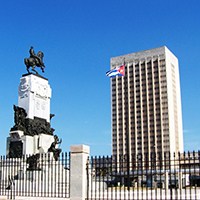This month, the Brazilian government announced plans to employ some 6,000 Cuban doctors as part of an effort to strengthen Brazil-Cuba bilateral ties. In an email interview, John M. Kirk, a professor at Canada’s Dalhousie University who co-wrote a book on Cuban medical internationalism and is finishing a second on Cuban medical cooperation, explained the history of Cuba’s medical diplomacy and its importance to Cuba’s slowly reforming economy.
WPR: What is the extent of Cuba’s medical diplomacy in terms of numbers of doctors sent abroad and the benefits Cuba receives in return?
John M. Kirk: Cuba has been sending medical personnel abroad since 1960. At present there are some 39,000 Cuban medical personnel—including 15,000 doctors, approximately 20 percent of Cuba’s physicians—serving abroad in 68 countries. In Venezuela alone there are 32,000 Cuban medical personnel, 11,000 of them physicians. The export of professional, mainly medical, services is Cuba’s largest single source of hard currency, accounting for some $6 billion in 2012. Cuba has one doctor for every 170 patients, compared to one doctor per 390 patients in the United States, and continues to graduate large numbers of doctors. There is thus a surplus of trained medical personnel in Cuba, and this will continue to be a primary source of income.

